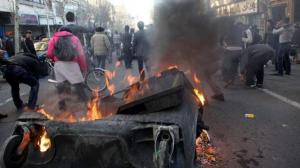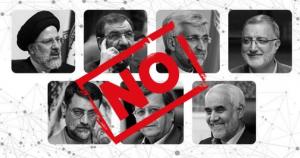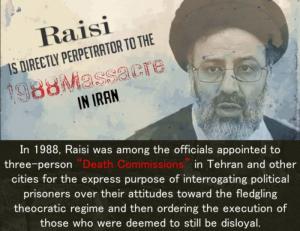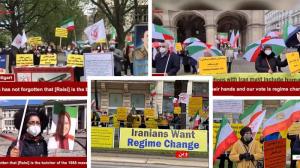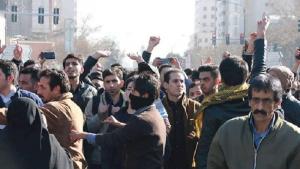
The movement also set the stage for the electoral boycott by announcing the people’s rejection of both the “hardline” and “reformist” factions of mainstream Iranian politics.
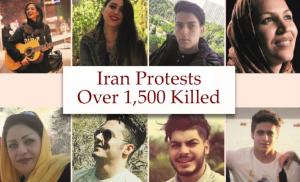
Reuters confirmed in a special report on December 23, 2019, about the deadly crackdown on November nationwide protests in Iran the death toll of 1500 that was announced by the People’s Mojahedin Organization of Iran (PMOI) on December 15, 2019.
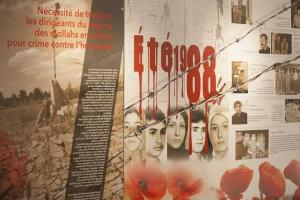
As the deputy prosecutor for Tehran at the time of the massacre, Raisi played a leading role in the death commissions’ operations and arguably came away from incident bearing responsibility for the vast majority of the 30,000 deaths.
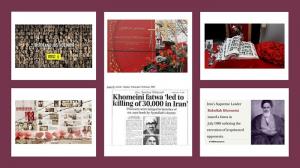
In 1988 the regime’s founder Ruhollah Khomeini issued a fatwa declaring that the MEK were enemies of God and should be executed accordingly.
It is now virtually certain that Raisi will be the next president of the Iranian regime. Six other candidates have been cleared by the regime’s Guardian Council
— NCRI
PARIS, FRANCE, May 31, 2021 /EINPresswire.com/ — It is now virtually certain that Ebrahim Raisi will be the next president of the Iranian regime. Six other candidates have been cleared by the regime’s Guardian Council to appear on the June 18 ballot, but Raisi is the favorite of Supreme Leader Ali Khamenei, and none of the others have nearly as high a profile.The Guardian Council made sure of this by eliminating such prospective candidates as the regime’s former President Mahmoud Ahmadinejad and former Parliament Speaker Ali Larijani. Although the former responded by saying he now refuses to vote, the latter proclaimed that he was “satisfied” and then urged all Iranian citizens to participate in the election as a way of promoting the survival of an “Islamic Iran.”
Larijani’s appeal is widely expected to fall on deaf ears, however. Multiple state media outlets have published commentaries in recent weeks which anticipate extremely low voter turnout, possibly leading to a renewal of the public unrest. Those outlets acknowledged that the presidential election might break the record for the lowest turnout that was set just last year when the regime-held its latest parliamentary elections.
When more than half of eligible voters boycotted the polls in February 2020, it confirmed the staying power of a movement for regime change that began gaining traction at the start of 2018. It was that the People’s Mojahedin Organization of Iran (PMOI/MEK) was credited with sparking mass protests that quickly encompassed more than 100 localities and gave rise to chants of “death to the dictator” and other explicit calls for regime change.
The movement also set the stage for the electoral boycott by announcing the people’s rejection of both the “hardline” and “reformist” factions of mainstream Iranian politics. But first, it inspired a number of other protests, including an even larger nationwide uprising in November 2019.
Whereas the January 2018 uprising resulted in dozens of deaths and thousands of arrests, the regime’s backlash was much more immediate and severe the following year. After Khamenei directed authorities to restore order by any means necessary, the Islamic Revolutionary Guard Corps opened fire on crowds of protesters, killing approximately 1,500.
More than 12,000 arrests followed, and a September 2020 report from Amnesty International detailed some of the torture that was still being meted out to many of those arrestees at the time, both as a form of extrajudicial punishment and as part of a longstanding strategy to secure false confessions and justify prosecution for crimes against national security.
It is presumably no coincidence that 2019’s upsurge in repression of dissent 2019 was immediately preceded by the appointment of Ebrahim Raisi as the head of the Iranian judiciary. Raisi had long since established his reputation as one of the country’s leading hanging judges and a staunch advocate for punitive amputation and other forms of corporal punishment. All these things reinforced the legacy of his participation in a massacre of political prisoners in 1988, at a time of particular vulnerability for the clerical regime.
In 1988 the regime’s founder Ruhollah Khomeini issued a fatwa declaring that the MEK were enemies of God and should be executed accordingly. In response “death commissions” were convened in prisons throughout Iran to interrogate political prisoners over their political views and affiliations, focusing particular attention on the MEK. Those who refused to disavow the group or who otherwise failed to demonstrate fealty to the theocratic system were sentenced to hang, and these hangings were generally carried out in groups before the victims were taken away on refrigerator trucks for burial in secret mass graves.
As the deputy prosecutor for Tehran at the time of the massacre, Raisi played a leading role in the death commissions’ operations and arguably came away from incident bearing responsibility for the vast majority of the 30,000 deaths. Neither he nor any other participant has been held accountable at home or abroad for this obvious crime against humanity, and with his perspective role as the country’s next president, it is clear that the regime continues to reward human rights abusers for their brutality and intolerance of dissent.
Of course, this display of contempt for the lives of ordinary Iranians will only exacerbate the crises the regime has been struggling to deal with since the January 2018 uprising. And although authorities have been doing their best to downplay these crises, the daily newspaper Jahan-e Sanat observed that official silence over the uprisings and subsequent repression has fueled the popularity of electoral boycotts.
The MEK has specifically framed that boycott movement as an effort to “vote for regime change,” and the MEK’s “Resistance Units” have placed graffiti and posters in more than 250 locations nationwide to convey that message. In recent weeks, the effects of this campaign have seemingly been visible in public demonstrations over a range of other issues. Whether protesting the declining value of pensions or the effects of a government-run investment scam, countless Iranians have shown willingness to embrace the electoral boycott by chanting slogans like, “We have seen no justice; we will not vote anymore.”
By rejecting the entire electoral process, the Iranian people are making a clear statement about the illegitimacy of the ruling system. Even under normal circumstances, this would have opened them up to the prospect of bloody repression. But in the wake of the November 2019 crackdown, with Raisi’s brutal approach to law enforcement having just been rewarded with an unobstructed path to the presidency, the threat of political violence is intensified.
The widespread endorsement of the boycott is therefore both a testament to the resilience of the Iranian Resistance movement and a warning about the international community’s responsibility. Western powers and the United Nations should make it clear that they are aware of Raisi’s crimes both historic and recent, and they should hold the regime accountable for those crimes and also for the inevitable unrest that is to come.
And when that unrest does emerge on a scale equal or greater to that of the November 2019 uprising, the international community should be more proactive than before in affirming the validity of participants’ grievances and demands. That legitimacy stands in stark contrast to the inherent illegitimacy of Iran’s existing system of government – something that will be confirmed for all the world on June 18 when Ebrahim Raisi ascends to the presidency in absence of competitors and in the presence of a massive electoral boycott organized by the MEK.
<
p class=”contact c9″ dir=”auto”>Shahin Gobadi
NCRI
+33 6 50 11 98 48
email us here
Visit us on social media:
Facebook
Twitter
People’s Mojahedin Organization of Iran – MEK IRAN 821 subscribers Iranian opposition PMOI/MEK Resistance Units call for Iran Election Boycott — May 2021
![]()

